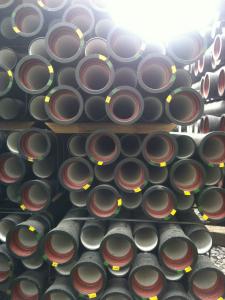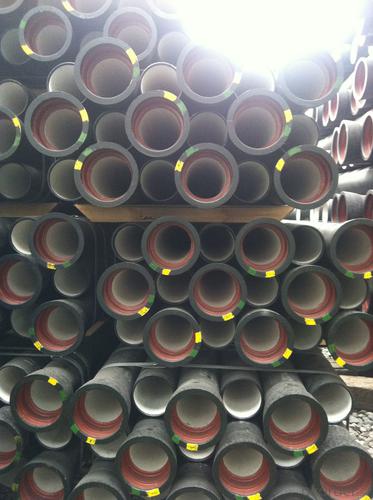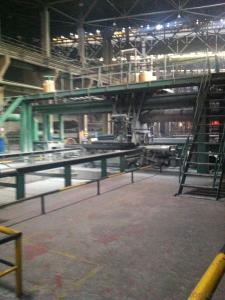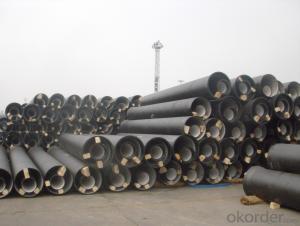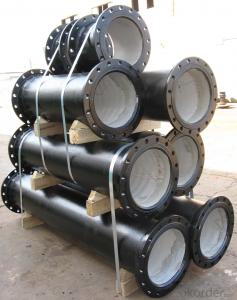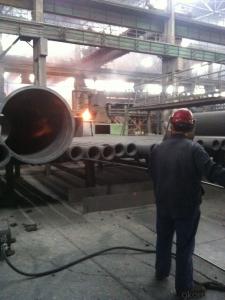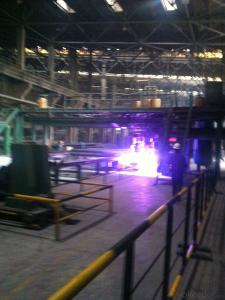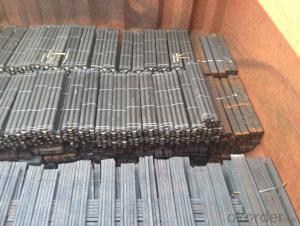DUCTILE IRON PIPE AND PIPE FITTINGS K8CLASS DN500
- Loading Port:
- Tianjin
- Payment Terms:
- TT OR LC
- Min Order Qty:
- 23 pc
- Supply Capability:
- 3000 pc/month
OKorder Service Pledge
OKorder Financial Service
You Might Also Like
Material : Ductile Cast Iron
Size Range : DN 80mm to DN 2000mm
Unit Effective Length : 6m or 5.7m
Manufacture Standard: ISO 2531:1998/ EN 545:2006/EN 598:2007
Annual capacity : 200,000 tons
Coating Exterior: Zinc 130g/m2 according to ISO 8179-1 and bitumen coating 70 microns.
Cement Interior: Portland Cement/ High Alumina Cement/ Sulphate Resisting Cement Lining according to ISO 4179
Special requirements on external coating and internal lining can be applied
We also provide accessories such as SBR/EPDM rubber gaskets, lubricant paste, pipe caps, PE sleeves, etc.
Additional Parts:
Each pipe is strictly inspected according to related standard to ensure permanently high performance.
Easy Installation at site and service free for life
Long Service Lifespan
Quotation will arrive you within 24hours once we get your inquiry.
We guarantee offering you a competitive price.
A copy of original inspection reports of pipes will be offered after shipment.
Photos of loading process will be sent to the customer after shipment effect.
We will follow-up the delivery progress after shipment effect and update to the customer on weekly basis.
- Q: Can ductile iron pipes be used in nuclear power plants?
- Yes, ductile iron pipes can be used in certain applications within nuclear power plants. However, their use is limited to non-safety-related systems where they are not exposed to radioactive environments or high-pressure conditions. Safety-related systems within nuclear power plants typically require materials with higher resistance to radiation and pressure, such as stainless steel or other specialized alloys.
- Q: Do ductile iron pipes require internal linings for potable water?
- Internal linings are not required for potable water in ductile iron pipes. Ductile iron, a type of iron that has been strengthened and made more flexible, is commonly used in water distribution systems due to its durability and resistance to corrosion. Unlike cast iron or steel, ductile iron pipes have a protective cement-mortar lining. This lining acts as a strong barrier against corrosion and prevents the release of harmful substances into the water. It is applied during the manufacturing process and is designed to withstand the corrosive properties of potable water, eliminating the need for internal linings. Furthermore, the smooth surface of ductile iron pipes ensures the quality and flow of water without the necessity of additional linings.
- Q: Do ductile iron pipes require internal linings or coatings?
- Ductile iron pipes do not typically require internal linings or coatings. Ductile iron is known for its inherent corrosion resistance, which is primarily due to its composition and microstructure. The iron in ductile iron pipes is treated with magnesium, resulting in the formation of graphite nodules that give the material its ductile properties. This microstructure also provides a protective layer on the surface of the pipe, which helps to prevent corrosion. Additionally, ductile iron pipes have been used for several decades without the need for internal linings or coatings, proving their durability and resistance to corrosion. The smooth interior surface of ductile iron pipes also helps to minimize friction and maintain efficient flow rates. However, in certain cases where the conveyed fluid is highly corrosive or abrasive, or if the water quality is aggressive, internal linings or coatings may be recommended. These linings or coatings can be applied to protect the pipe from chemical attack or to prevent the leaching of iron into the water supply. Ultimately, the decision to use internal linings or coatings on ductile iron pipes depends on various factors such as the specific application, water quality, and local regulations. Consulting with professionals in the field, such as engineers or pipe manufacturers, can provide more tailored advice for specific scenarios.
- Q: How does ductile iron pipe perform in sandy or unstable soils?
- Due to its inherent strength and flexibility, ductile iron pipe exhibits exceptional performance in sandy or unstable soils. Its composition, which includes a combination of iron, carbon, and small amounts of other elements, grants it superior mechanical properties compared to other pipe types. In sandy soils, where the ground may shift and cause pipe movement and deformation, ductile iron's high tensile strength and elongation characteristics enable it to withstand pressure and stress without fracturing or breaking. Its flexibility allows it to accommodate soil movement and settlement, reducing the risk of pipe failure. Furthermore, ductile iron pipe's resistance to corrosion makes it highly suitable for installation in sandy soils. The application of protective linings and coatings on both the interior and exterior of the pipe prevents corrosive elements in the soil from attacking the iron, ensuring durability and reliability in the long term. In unstable soils with varying compaction levels or weak load-bearing capacity, ductile iron pipe's sturdy construction provides stability and support. Its robustness allows for even distribution of loads, minimizing the chances of pipe deflection or collapse. Moreover, the joint design and sealing methods of ductile iron pipe, such as push-on joints or mechanical joints with rubber gaskets, offer excellent leak resistance and prevent soil infiltration. This further enhances its performance in sandy or unstable soils. Overall, the combination of strength, flexibility, corrosion resistance, and reliable joint systems makes ductile iron pipe an ideal choice for applications in sandy or unstable soils. It provides a long-lasting and efficient solution for the transmission of water and wastewater.
- Q: Can cast iron pipes not be used for domestic water supply and drainage?
- Can be used for life drainage, I last year to do the public construction, 24 layers of life and drainage on the cast iron pipe.
- Q: What are the interface forms of ductile iron pipes? The best drawings are available. Thank you
- There are many kinds of ductile iron pipe interfaces, and the T type interface (sliding type) flexible interface is famous for its fast installation and simple installation.
- Q: How are ductile iron pipes protected against external impact or loading?
- Ductile iron pipes undergo various methods and measures to safeguard them against external impact or loading, guaranteeing their durability and integrity. Several common approaches are employed to protect ductile iron pipes, including: 1. Adequate Thickness and Strength: Ductile iron pipes are designed with ample wall thickness and high strength to withstand external loads and impacts. This design feature ensures that the pipes can endure heavy loads without deforming or cracking. 2. Implementation of Coatings: Ductile iron pipes are typically coated with protective layers to create an additional barrier against external impact. These coatings may comprise cement mortar lining, polyethylene encasement, or epoxy coatings. They not only grant impact resistance but also safeguard against corrosion. 3. Utilization of Proper Bedding and Backfilling Techniques: Proper techniques for bedding and backfilling are crucial in protecting ductile iron pipes from external loads. The correct placement of pipes within suitable materials, such as compacted granular bedding and backfill, helps distribute external loads evenly and minimizes the risk of pipe damage. 4. Consideration of Trench Design: The design of the trench in which ductile iron pipes are installed plays a vital role in safeguarding them against external impact. The dimensions of the trench, slope stability, and proper compaction of the backfill are all taken into account to reduce the likelihood of damage caused by external loads. 5. Implementation of Effective Pipe Layout and Support: Appropriate pipe layout and support are essential for protecting ductile iron pipes from external impact. Sufficient support mechanisms, including thrust blocks, pipe anchors, and pipe restraints, are utilized to absorb and distribute external loads, preventing any damage to the pipes. 6. Installation of Protective Structures: In areas where the risk of external impact is higher, additional protective structures are installed to safeguard ductile iron pipes. These structures may include concrete encasements, bollards, or reinforced concrete slabs, which act as physical barriers against potential impacts. In conclusion, a combination of factors, including pipe strength, coatings, proper installation techniques, and support measures, work together to ensure the protection of ductile iron pipes against external impact or loading. These measures enhance the longevity and reliability of the pipes, guaranteeing efficient performance in various applications.
- Q: What's the difference between ductile iron pipe and cast iron pipe?
- Ductile iron pipe is based on cast iron, changed some of the characteristics of the structure of iron, so that it has become a lot of toughness, than the cast iron pipe is too brittle shortcomings much better, the tensile strength of the pipe bending strength greatly improved. The sealing material used in the socket interface is rubber ring.
- Q: Is the crankshaft material forged or ductile iron?
- Cast iron can not be forged, only steel, malleable iron can not be forged, only the crankshaft is particularly hot, can not meet the strength of the hardening when forging
- Q: What are the different types of linings available for ductile iron pipe?
- Ductile iron pipes offer various linings with distinct advantages and applications. 1. Cement mortar lining: The most commonly used lining for ductile iron pipes is cement mortar. It involves applying a layer of cement mortar to the pipe's interior surface. This lining excels in resisting corrosion and chemical attacks, making it suitable for potable water distribution, wastewater conveyance, and industrial pipelines. Additionally, it improves flow efficiency by reducing friction and turbulence within the pipe. 2. Polyethylene lining: Ductile iron pipes often utilize polyethylene linings when corrosion resistance is a primary concern. This lining consists of a layer of high-density polyethylene (HDPE), either extruded or sprayed onto the inner surface of the pipe. Polyethylene lining provides exceptional resistance to corrosion, abrasion, and chemical attacks, making it ideal for transporting aggressive fluids such as saltwater, chemicals, or industrial waste. 3. Polyurethane lining: For applications requiring protection against abrasive wear, polyurethane linings are commonly employed in ductile iron pipes. This lining is created by spraying or pouring a layer of polyurethane onto the inner surface of the pipe. Polyurethane lining offers excellent resistance to abrasion, impact, and chemical attacks. It is suitable for conveying abrasive slurries, mining applications, and other high-wear environments. 4. Epoxy lining: To safeguard against corrosion and chemical attacks, epoxy linings are applied to ductile iron pipes. This lining is typically formed by applying a layer of epoxy resin to the pipe's inner surface using centrifugal casting or electrostatic spraying. Epoxy lining demonstrates outstanding adhesion and corrosion resistance, making it suitable for various applications like potable water distribution, wastewater treatment, and industrial pipelines. 5. Zinc lining: Ductile iron pipes employ zinc linings to provide cathodic protection against corrosion. This lining involves applying a layer of zinc to the pipe's inner surface through hot-dip galvanizing or electroplating. Zinc lining acts as a sacrificial anode, corroding preferentially to the iron pipe and shielding it from corrosion. It is commonly used in highly corrosive environments like seawater or acidic soils. Ultimately, the selection of a lining for ductile iron pipes relies on the specific requirements of the application, including the transported fluid, desired corrosion resistance, and potential for abrasive wear. Seeking guidance from industry experts and considering factors like cost, longevity, and maintenance requirements aids in determining the most suitable lining option for a particular project.
Send your message to us
DUCTILE IRON PIPE AND PIPE FITTINGS K8CLASS DN500
- Loading Port:
- Tianjin
- Payment Terms:
- TT OR LC
- Min Order Qty:
- 23 pc
- Supply Capability:
- 3000 pc/month
OKorder Service Pledge
OKorder Financial Service
Similar products
Hot products
Hot Searches
Related keywords
